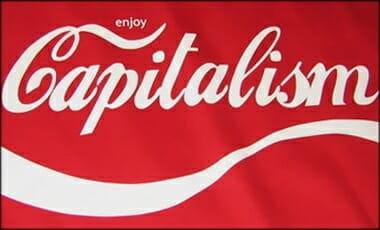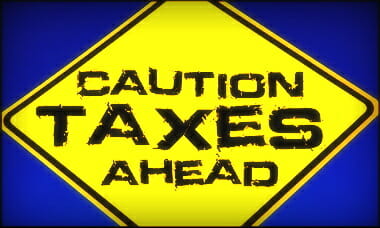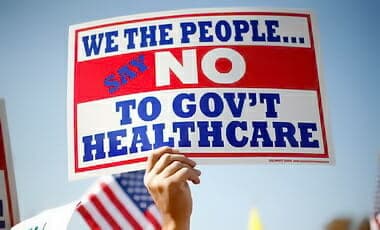Is there a “secret” to success? Yes, but it’s not a secret. Michele Tafoya, Sideline Reporter for NBC Sunday Night Football, shares the secret…that you already knew.
Prager U


Are Some Cultures Better than Others?
Are some cultures better than others? Or are all cultures and their values equal? Bestselling author Dinesh D’Souza, who was born in India and moved to America, explains.

Is the Southern Poverty Law Center Itself a “Hate Group”?
Originally posted in April, 2012
POWERLINE has recently posted on this in two parts (Part 1 | Part 2). Here is a portion of their PART ONE:
I didn’t realize that I was following in the footsteps of former Vanderbilt political science professor Carol Swain, who called the SPLC’s number in a post she wrote about it for the Huffington Post in September 2009. Professor Swain concluded the post: “Rather than monitoring hate groups, the Southern Poverty Law Center has become one.”
This could not stand. In today’s Wall Street Journal Professor Swain tells the rest of the story:
The SPLC’s retaliation was vicious and effective. On Oct. 17, 2009, my photo appeared on the front page of my local newspaper, the Tennessean, with the headline “ Carol Swain is an apologist for white supremacists.” That was a quote from Mark Potok, at the time the SPLC’s national spokesman. The context for Mr. Potok’s attack was a review I gave for a film titled “A Conversation About Race.” I endorsed it for classroom use because it offered a perspective on race rarely encountered on university campuses. Mr. Potok argued that the filmmaker was a bigot. I felt then and now that the perspective needed to be heard.
This negative article was featured on the front pages of several newspapers and it went viral, especially in black media outlets. The attacks did not subside until this newspaper’s website published a lengthy article titled “In Defense of Carol Swain.”
Being targeted by the SPLC has had a lasting impact on my life and career. Offers from other universities ended and speaking opportunities declined. Once you’ve been smeared in this way, mainstream news outlets are less likely to cite you as an expert of any kind.
Professor Swain knows she is in good company:
[T]oday I wear the SPLC’s mud as a badge of honor because I know I am in the company of many good men and women who have been similarly vilified for standing for righteousness and truth. Other SPLC targets have included Ben Carson (who eventually received an apology and retraction), Somali refugee Ayaan Hirsi Ali, terrorism expert Steve Emerson, political scientist Guenter Lewy (who successfully sued the SPLC), attorney Robert Muise, Frank Gaffney of the Center for Security Policy, and Princeton professor Robert P. George. The SPLC has tagged Mr. George, a devout Catholic intellectual, as “anti-LGBT.”…..
And the video at the top of this update is from PART TWO. But the Wall Street Journal article is a “pay-to-play” article. I have found a decent excerpt at FOX NEWS. PART THREE is more of a biography and statement of amazement regarding Professor Swain:
….According to her Wikipedia entry, Swain grew up in a shack without running water. She and her eleven siblings shared two beds. She did not have shoes and thus missed school whenever it snowed. She did not attend high school, dropping out in ninth grade.
When her mother and abusive stepfather moved the family to Roanoke, Swain appealed to a judge to be transferred to a foster home. When her appeal was denied, she lived with her grandmother in a trailer park.
Intimately familiar with the south and with poverty, Swain also knows about the law, having earned a master’s degree from Yale Law School. This was the culmination of an education that begin with a GED, and was followed by an associate degree from Virginia Western Community College; a B.A. in criminal justice from Roanoke College; a master’s degree in political science from Virginia Tech; and a Ph.D. in political science from the University of North Carolina at Chapel Hill.
Swain went on to become a professor at leading universities and the author of several books. One was cited by Supreme Court Justices Anthony Kennedy and Sandra Day O’Connor. Two dealt with the topic of white nationalism.
There is an obvious disconnect when an African-American from the south rises from extreme poverty to glittering scholarly success, only to be branded an “apologist for white supremacists” by the Southern Poverty Law Center….
So what is the hub-bub about with the SPLC? One blogger calls it as they see it:
The Montgomery, Alabama-based Southern Poverty Law Center (SPLC), has quite a racket going on. Now, they don’t practice poverty law as their name suggests, but they do spread hate, and lots of it too. In the name of the almighty dollar, the SPLC will slander and defame anyone it chooses. Especially those with the temerity to oppose their extreme, leftwing ideological views.
[….]
The SPLC is a racket. Contrary to it’s name, the Southern Poverty Law Center does not practice poverty law, but instead serves a 2-fold purpose: 1) lining the pockets of Morris Dees, the SPLC’s staff, its directors, and various cronies; and 2) serve as attack dogs for the government and radical left (did I repeat myself?).
The Southern Poverty Law Center bills itself as a watchdog of hate groups. But is this just a cover for its true aims? Journalist and author Karl Zinsmeister explains.
Take note as well that many Black groups and individuals stand against the SPLC, as Godfather Politics points out:
A coalition of African-American pastors and pro-family Christian and Jewish leaders held a press conference outside the headquarters of the Southern Poverty Law Center in Montgomery, Alabama, to protest the SPLC’s smearing of pro-family groups that oppose homosexual activism as “hate groups.”
The SPLC has been co-opted by a Leftist, pro-homosexual, anti-Christian agenda. If you don’t agree with the SPLC leftist litmus test, then you are a de facto “hate group.” With its new definition of what constitutes a hate group, the SPLC has become a fund-raising machine. It’s no wonder that the organization is flush with cash. At the end of fiscal year 2010 SPLC’s endowment stood at $216.2 million. Ultimately, the tactic is to strike fear in middle-America so the checks keep rolling in. Most communities don’t see skinheads or even KKKers, so the SPLC needs a tangible enemy.
In other words, a money maker from its left leaning donors. Conservapedia points out the obvious, that by labeling Michele Bachmann, Glenn Beck, Ron Paul, and Judge Napolitano, as well as conservative Christian oragnizations that stand against same-sex marriage in with other hate groups, that this “proves that the SPLC is a left-wing political organization rather than one focused on racism and civil rights.” (I wish to point out that Conservapedia includes as normative some groups I would not have, like the John Birch Society, VDARE, and others.)
While I can understand and maybe support their position on the John Birch Society and Alex Jones… the main point still stands: This … further proves that the SPLC is a left-wing political organization rather than one focused on racism and civil rights.
The following half-hour / in-depth review of the SPLC is by the John Birch Society, which… for the record — I do not endorse nor recommend their [John birch Society’s] resources. However, this presentation is a decent excoriation of the “craziness” over at this liberal propaganda machine:
The problem with this whole venture by the left is that it destroys the institutions it touches. The SPLC at one point may have had honorable goals, but when leftism infects things, it destroys them. So the power behind the original ideas and goals of the SPLC are negated — rendered ineffective/powerless — by their newer political goals. As Dennis Prager points out in regards to whatever the Left touches:

If You Hate Poverty, You Should Love Capitalism
Did you know that since 1970, the percentage of humanity living in extreme poverty has fallen 80 percent? How did that happen? Arthur Brooks, president of the American Enterprise Institute, explains.

Why Is Health Insurance so Complicated?
Why is health insurance so complicated, while car insurance and life insurance are so simple? Can health insurance be more like, well, insurance? Lanhee Chen, fellow at the Hoover Institution, explains.

The Inconvenient Truth About the Democratic Party (BOOM!)
- “…virtually every significant racist in American political history was a Democrat.”
~ Bruce Bartlett, Wrong on Race: The Democratic Party’s Buried Past (New York, NY: Palgrave MacMillan, 2008), ix;
- “…not every Democrat was a KKK’er, but every KKK’er was a Democrat.”
~ Ann Coulter, Mugged: Racial Demagoguery from the Seventies to Obama (New York, NY: Sentinel [Penguin], 2012), 19.
Did you know that the Democratic Party defended slavery, started the Civil War, founded the KKK, and fought against every major civil rights act in U.S. history? Watch as Carol Swain, professor of political science at Vanderbilt University, shares the inconvenient history of the Democratic Party. [See my larger page addressing many of these issues.]
Some GOP Milestones
1854 – First Republican Party Meeting In Ripon, Wisconsin.
1854 – Under The Oaks Convention.
- Formal organization of the GOP took place in July, 1854 at a convention in Jackson, Michigan. Thousands of anti-slavery activists were present and two years later, in 1856, the first Republican National Convention took place in Philadelphia, at which the party’s Constitution was written.
1863 – President Abraham Lincoln Issues Emancipation Proclamation.
- Less than a decade later, on January 1, 1863, President Abraham Lincoln issued the Emancipation Proclamation which followed, in 1864, by the Republican National Convention’s call for the abolition of slavery.
1865 – Republican-Controlled 38th Congress Passes The 13th Amendment Abolishing Slavery.
- In 1865, Congressional Republicans passed the 13th Amendment which abolished slavery–unanimously, with only a few Democrat votes. The 13 Amendment conferred U.S. citizenship on all black Americans and afforded them “full and equal benefit of all laws and proceedings for the security of person and property as is enjoyed by white citizens.”
1866 – With Unanimous Republican Support And Against Intense Democrat Opposition, Congress Passes The 14th Amendment.
The 14 Amendment, passed on June 13, 1866, also garnered unanimous support from Republicans and vehement opposition from Democrats. Section 1 of the amendment states:
“All persons born or naturalized in the United States, and subject to the jurisdiction thereof, are citizens of the United States and of the state wherein they reside. No state shall make or enforce any law which shall abridge the privileges or immunities of citizens of the United States; nor shall any state deprive any person of life, liberty, or property, without due process of law; nor deny to any person within its jurisdiction the equal protection of the laws.”
Following the Civil War, much of the work towards civil rights for blacks was initiated by the wing of the Republican party known as the Radical Republicans. They were referred to as “radical” because of their strong stance on these and other issues. The right that provoked the greatest controversy concerned black male suffrage.
1867 – Congress passed a law requiring the former Confederate states to include black male suffrage in their new state constitutions. Ironically, even though black men began voting in the South after 1867, the majority of Northern states continued to deny them this basic right.
1869 – Finally, at the end of February 1869, Congress approved a compromise amendment that didn’t specifically mention black men:
Section 1: The right of citizens of the United States vote shall not be denied or abridged by the United States or by any State on account of race, color, or previous condition of servitude.
Section 2: The Congress shall have the power to enforce this article by appropriate legislation.
Once approved by the required two-thirds majorities in the House and Senate, the 15th Amendment had to be ratified by 28, or three-fourths, of the states. Due to reconstruction laws, black male suffrage already existed in 11 Southern states. While Congress debated the 15th Amendment early in 1869, 150 black men from 17 states assembled for a convention in Washington, D.C. This was the first national meeting of black Americans in the history of the United States. Frederick Douglass was elected president of the convention.
Despite Democratic opposition, the Republican party secured ratification victories throughout 1869. Ironically, it was a Southern state, Georgia that clinched the ratification of the 15th Amendment on February 2, 1870.
On March 30, President Grant officially proclaimed the 15th Amendment as part of the Constitution. Washington and many other American cities celebrated. More than 10,000 blacks paraded through Baltimore. In a speech on May 5, 1870, Frederick Douglass rejoiced. “What a country — fortunate in its institutions, in its 15th Amendment, in its future.”
1872 – Republican-Controlled 42nd Congress Establishes Yellowstone As First National Park.
1872 – First African-American Governor, Pinckney Pinchback (R-La), Inaugurated.
It was during this period of time,
1875 – landmark legislation was introduced—The Civil Rights Act of 1875. Introduced by Radical Republican Senator Charles Sumner of Massachusetts, it “guaranteed all citizens, regardless of color, access to accommodations, theatres, public schools, churches, and cemeteries. The bill further forbid the barring of any person from jury service on account of race, and provided that all lawsuits brought under the new law would be tried in federal, not state, courts.” Unfortunately, Sumner died before the passage of his bill. The senator died of a heart attack in 1874 and as he lay dying, he said: “Don’t let the bill fail.” He exhorted Frederick Douglass and the others at his bedside to take care of his civil rights bill.
In the years following the turn of the century, the women’s rights movement began to gain some steam and was solidly Republican. Most suffragists, including Susan B. Anthony, favored the GOP.
1917 – First Woman In Congress, Rep. Jeannette Rankin (R-Mt), Sworn In.
1919 – Republican Controlled 66th Congress Passes The 19th Amendment Guaranteeing Women The Right To Vote.
- The 19th Amendment was written by a Republican senator and received greater support from Republicans than from Democrats. It was passed by Congress on June 4, 1919 and ratified on August 18, 1920. It guarantees American women the right to vote. Prior to the passage and ratification of the 19th Amendment, in 1917 the first woman was elected to Congress. Rep. Jeannette Rankin (R-MT) was sworn in on June 4, 1919.
1924 – the Republican-controlled 68th Congress and President Calvin Coolidge granted citizenship to Native Americans with the Indian Citizenship Act.
1928 – Sen. Octaviano Larrazolo (R-NM) was sworn in as the first Hispanic U.S. Senator.
1949 – Margaret Chase Smith (R-Me) Becomes The First Woman To Serve In Both The Senate And The House Of Representatives.
1954 – Brown V Board Of Education Strikes Down Racial Segregation In Public Schools; Majority Decision Written By Chief Justice Earl Warren, Former Governor (R-Ca) And Vice Presidential Nominee.
1957 – President Eisenhower, who appointed Justice Warren, sent Congress a proposal for civil rights legislation. The end result was the Civil Rights Act of 1957 which established the Civil Rights Section of the Justice Department and enabled federal prosecutors to obtain court injunctions against interference with the right to vote. It also established the Civil Rights Commission which was given the authority to investigate discriminatory conditions and recommend corrective measures. In the end, however, the final act was weakened by Congress due to lack of support from Democrats. President Eisenhower was also responsible for sending U.S. troops to Arkansas to desegregate schools.
1959 – The Republican party also produced the first Asian-American U.S. Senator, Hiram Fong (R-HI).
1964 – Senate Passes The 1964 Civil Rights Act in which the Republican leader, Everett Dirksen (R-IL), defeated a Democrat filibuster.
The Civil Rights Act of 1964:
“…is the nation’s benchmark civil rights legislation, and it continues to resonate in America. The Civil Rights Act of 1964 prohibits discrimination on the basis of race, color, religion, sex or national origin. Passage of the Act ended the application of ‘Jim Crow’ laws, which had been upheld by the Supreme Court in the 1896 case Plessy v. Ferguson, in which the Court held that racial segregation purported to be ‘separate but equal’ was constitutional. The Civil Rights Act was eventually expanded by Congress to strengthen enforcement of these fundamental civil rights.”
According to the Michael Zak, in his book, Back to Basics for the Republican Party:
“On this day in 1964, Everett Dirksen (R-IL), the Republican Leader in the U.S. Senate, condemned the Democrats’ 57-day filibuster against the 1964 Civil Rights Act. Leading the Democrats in their opposition to civil rights for African-Americans was Senator Robert Byrd (D-WV). Byrd, who got into politics as a recruiter for the Ku Klux Klan, spoke against the bill for fourteen straight hours. Democrats still call Robert Byrd ‘the conscience of the Senate.’”
In addition to that, the House version of the Civil Rights Act of 1964 was supported by only 61 percent of that Chamber’s Democrats while 80 percent of Republicans embraced the act. In the final Senate vote on the Act, it received 82 percent of the Republican vote and was opposed by 69 percent of Democrats.
Similarly, 94 percent of Senate Republicans voted in favor of the Voting Rights Act of 1965 versus 73 percent of Democrats. The final vote on the House’s version was even more stark as only one Senate Republican voted against it while seventeen Democrats opposed it. In the House, 82 percent of Republicans supported the bill versus 78 percent of Democrats.
1980 Election of Reagan:
1981 – Sandra Day O’connor, Appointed By President Reagan, Becomes First Woman On The Supreme Court.
1987 – President Ronald Reagan Calls For Liberation Of East Europeans From Communism With “Tear Down This Wall” Speech.

How’s Socialism Doing in Venezuela?
Venezuela is falling apart. Its economy? Ruined. Its people? Hungry. Its government? Corrupt. What happened? In a word, socialism. Debbie D’Souza, a native Venezuelan and political activist, explains.

Iraq: Won and Lost
What if people have the war in Iraq backwards? What if George W. Bush and the U.S. military won it, and Barack Obama and the Democrats gave it away? Well, we don’t have to wonder what if, because Pete Hegseth, who served in Iraq, explains what happened.

The War On Cars/Freedom
There is a war against cars in America. Regulators want Americans out of cars and onto trains, buses, and bicycles. Why? Because of what cars represent — freedom. Automotive expert Lauren Fix (“The Car Coach”) explains.
Ahhh…the freedom of being able to hop in your car and drive down a highway! When you hit the road, one thing is clear: cars embody the American spirit.

Why Did the Democratic South Become Republican?
The south used to vote Democrat. Now it votes Republican. Why the switch? Was it, as some people say, because the GOP decided to appeal to racist whites? Carol Swain, Professor of Political Science at Vanderbilt University, explains.
It was not until the Republican Revolution of 1994 that for the first time in modern American History the Republicans held a majority of Southern congressional seats, a full three decades after the passage of the Civil Rights Act of 1964. As the South became less racist, it became more Republican (NATIONAL REVIEW).

Taxes Are Killing Small Businesses
Did you know that U.S. businesses are taxed at one of the highest rates in the developed world? How bad is it? And why should you care? Watch this short video to find out.
This video is part of a collaborative business and economics project with Job Creators Network. To learn more visit about JCN.

Government Can’t Fix Healthcare
Why is the government so bad at healthcare? Why did Obamacare make it more expensive than it already was? Is there a solution? Former Member of Congress Bob McEwen explains.

